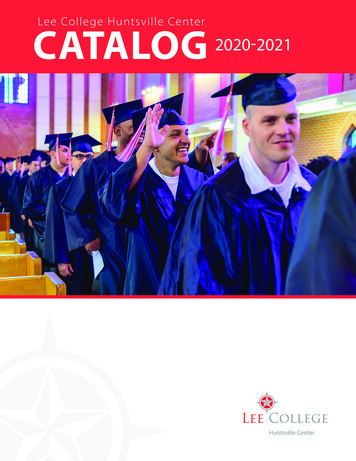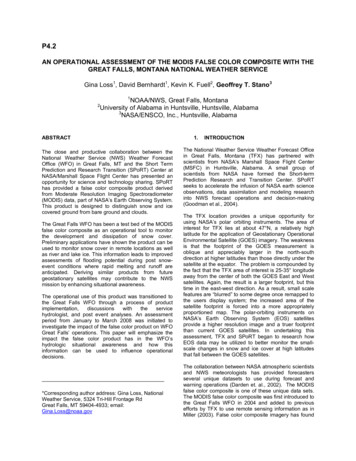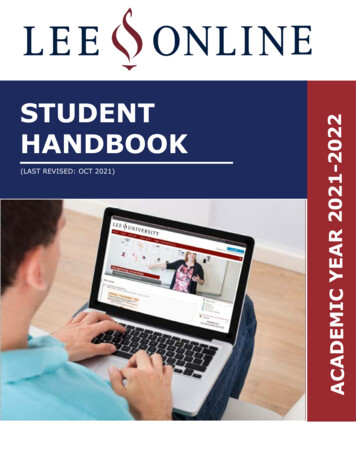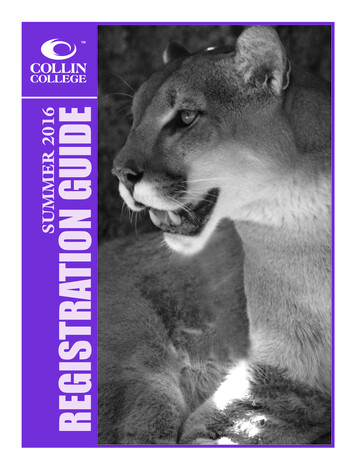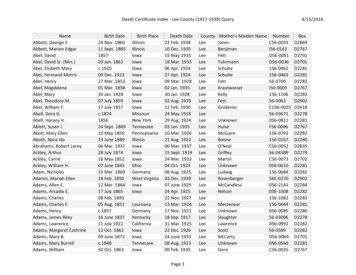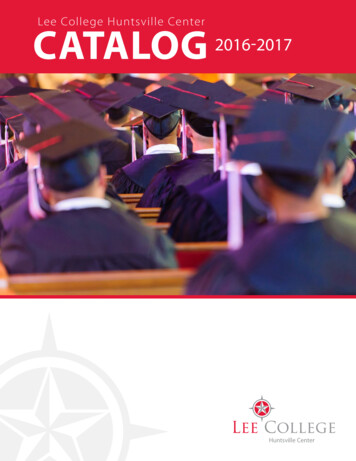
Transcription
Lee College Huntsville CenterCATALOG2016-2017Huntsville Center
Lee College/Huntsville Center CatalogAcademic Year 2016 - 2017168 C Colonel Etheredge Blvd.Huntsville, TX 77340Lee College/Huntsville Center is accredited by the Commission on Colleges of the Southern Association of Collegesand Schools, 1866 Southern Lane, Decatur, Georgia 30033-4097, (404) 679-4500, to award the Associate of Arts Degree,Associate of Science Degree, and the Associate of Applied Science Degree. Lee College programs are approved by theTexas Higher Education Coordinating Board and the Texas Education Agency.The college reserves the right to make changes in the policies set forth in this catalog without notice if necessitated bystate or federal action or the needs of the College. Policy changes and/or addenda, if any, will be printed in the classschedules.This catalog goes into effect the first day of the fall semester 2016.
Mission StatementEqual Education OpportunityStatementLee College serves as a focal point for the development ofeducated, gainfully employed, and socially aware residents ofour local community.Lee College is an open enrollment institution and offers avariety of vocational and academic programs. Lee College doesnot discriminate on the basis of gender, disability, race, color,age, religion, national origin, or veteran status in its educationalprograms, activities, or employment practices as required byTitle VII, Title IX, Section 504, ADA or 34 C. F. R. Limited Englishproficiency is not a barrier for admission to the college.Vision StatementProviding knowledge and skills to successfully navigate themodern worldFor information regarding student rights or grievanceprocedures, refer to Chapter 2 and 3 of this catalog or contactthe Office of the Dean of the Huntsville Campus, Lee College,168 C Colonel Etheredge Blvd., Huntsville, TX 77340 or call936.291.0452.Goals and OutcomesLearner Success:Enable success among all learners Improve persistence of all students to completion of theireducational intent Enrich learning through accessible and relevantexperiencesEnhance student engagement through learner support Declaración de Igualdad en laEducaciónLee College no discrimina en base de género, incapacidad,raza, religión, color, edad, origen nacional, opor condición deveterano military en los programas educativos, actividades, oempleo como es requerido bajo la Ley VII, Ley IX, Sección 504,o 34 C.F.R. Limitación en el idioma Inglés no impide admisión alcolegio.Community Enrichment:Advocate cultural and economic diversity Build bridges from education to employmentMake Lee College the preferred provider for training and workforce partnershipsStrengthen cultural initiatives that promote an enlightened communityPara información acerca de los derechos de los estudianteso del procedimiento de quejas, refierase al capítulo 2 de estecatálogo o póngase en contacto con la oficina del DecanoHuntsville Campus, Lee College, 168 C Colonel Etheredge Blvd.,Huntsville, TX 77340 or call 936.291.0452.Employee Success:Model persistence, completion, and excellence in learning Support professional development opportunities forfaculty, staff and administration Recognize and reward employee excellence Model safety in the work environmentInstitutional Effectiveness:Foster a culture of adaptability and continuousimprovementEmploy assessment processes that direct action for improvement Foster transparency in data analysis and decision making Implement technology to effectively improve educationaland operational processes and promote sustainabilityCatalog 2016-20171Huntsville Center
Table of ContentsFaculty & Administrative Personnel. 3Chapter 1 Admission to Lee College. 5Description (TDCJ Policy). 6TDCJ Admission Policy . 7Post Degree Program Participation. 7Technical Program. 8Transfer Students. 9Texas Success Initiative (TSIAA) Plan. 9Counseling and Advising.11Degree Plans (TDCJ Policy).11Transfer of Courses to Universities.11Student Financial Aid .12Tuition and Fees.12Administrative Tracking Of Students For Reimbursement.12Chapter 2 Student Services.15Student Rights and Responsibilities.16Information Regarding Classes.16Graduate Guarantee Program.16Transfer Dispute Resolution.16Academic Honesty .17Academic Honesty Code.17Student Appeals.18Policies Regarding Credit, Grades, and Student Records.20Evaluation of Transfer Credit.21Academic Fresh Start.21Academic Probation and Suspension.22TSI Coursework Progression .22Credit by Examination.23Transcripts Request.24Name Change Request.24Grade Change Policy.24General Graduation Requirements.24Course Waivers and Substitutions for Graduation .25Honor Societies.25Course Numbering System.25Chapter 3 Degrees and Certificates.27Associate Degrees.28Associate Of Applied Science (AAS) .29Certificates of Completion.29Lee College Degree and Certificate Listing.30General Education Requirements for AAS Degrees.31Degrees and Certificates Offered.32Chapter 4 Course Descriptions.41Chapter 5 History of Lee College and the Huntsville Center.55Catalog 2016-20172Huntsville Center
Faculty & Administrative PersonnelAllen, PaulFaculty, BusinessA.A.S., Navarro CollegeB.B.A., M.B.A., Sam Houston State UniversityMatthews, RobertRecruiter/AdvisorB.S., Kaplan UniversityM.S., Sul Ross UniversityBaker, JudyFaculty, BusinessB. S. Business Administration University of LaverneM. B. A. Florida Institute of TechnologyMcGlothern, MichaelFaculty, Microcomputer ApplicationsB.A., Sam Houston State UniversityM.S., University of Houston – Clear LakeBuxkemper, FelixCounselorB.A.T., M.Ed., Sam Houston State UniversityOldham, ColbyFaculty, BusinessB.S. Bellevue UniversityColeman, MelvinFaculty, Truck DrivingB.S., Sam Houston State UniversityOncken, EdgarFaculty, WeldingA.S., Blinn CollegeCorbell, BruceFaculty, Truck DrivingReynolds, AmandaFaculty, EnglishB.A. University of TexasM. A. University of HoustonEvans, BobAcademic AdvisorB.A., Sam Houston State UniversitySherman, TommyFaculty, Microcomputer ApplicationsA.A.S., Lee CollegeB. A., University of HoustonGibbs, MiecillenaFaculty, Microcomputer ApplicationsB. S., Sam Houston State UniversitySmith, ElizabethFaculty, HorticultureB.S. Tarlton State UniversityHunziker, BrianFaculty, Advanced Culinary ArtsA.A.S., Art Institute of HoustonTaylor, CorbettFaculty, Air ConditioningA.A.S. Sullivan Vocational Technical InstituteKnuppel, WayneFaculty, WeldingA.A., Wharton County Junior CollegeB.S., M.Ed., Sam Houston State UniversityTurner, JasonFaculty, Cabinet MakingB.S., Sam Houston State UniversityKoehl, FrederickFaculty, Cabinet MakingB.A., Sam Houston State UniversityLangley, James T. Jr.Faculty, HorticultureB.S., Sam Houston State UniversityWilliams, FrankFaculty, BusinessA.S. Trinity Valley Community CollegeB.B.A. The University of Texas at TylerM.B.A. Sam Houston State UniversityLangford, AngelaFaculty, Culinary ArtsA.A.S., Ashworth CollegeZuniga, DonnaDeanB.A.T., M.Ed., Sam Houston State UniversityLeBlanc, MichaelFaculty, Auto MechanicsA.A.S. Lone StarCatalog 2016-20173Huntsville Center
Chapter 1Admission to LCHCCatalog 2016-2017
Description (TDCJ Policy)College/University UnitCollege academic programs are offered to the TDCJ offenderswho have demonstrated a clear and convincing record ofrehabilitation while incarcerated as well as demonstrated anaptitude and ability to do college level study.Eligible offender students will be responsible for the costof all tuition, fees, and tests associated with the program.The offender student may pay these costs at registration byfollowing the TDCJ I-25 withdrawal procedures, outside pay, orthe offender will reimburse the state for these expenses afterrelease (PSER/TDCJ Loan). The student also may apply for theTexas Public Education grant (TPEG) or the Britt-Hodgin SecondChance Scholarship. Hazelwood benefits are available to anyeligible Texas veteran. Reimbursement of the TDCJ loan forpost-secondary programs will be required for all incarceratedoffenders who enroll in college courses.Students may apply for a Britt-Hodgin Second ChanceScholarship that will pay a one-time award of 6 SCH’s (semestercredit hours) in the semester that the student receives theaward. No student may receive Britt-Hodgin Second ChanceScholarship funds for more than one semester in any calendaryear.Post secondary academic programs consist of communityand university college credit courses, all of which may leadto degree completion. Technical certification programs arealso available through the community colleges. Collegeprogramming within Texas Department of Criminal Justiceis provided through interagency/inter-local contracts withcolleges and universities servicing the geographical areaswhere units are located. All offenders participating in theseprograms must meet the academic criteria for admissionas outlined in the respective college or university catalog.TDCJ has academic criteria that must also be met as wellas the requirement that all offenders receive security andclassification clearance before entry into a program.The University of Houston Clear Lake graduate program isavailable for qualified offenders. Tuition and fee expensesassociated with this program are the student’s responsibility.Alvin Community CollegeJester IIIRamsey IClemensStringfellowCentral Texas CollegeHilltopHughesMountain ViewMurrayWoodmanClarendonJordanLamar UniversityStilesLee erWynneSouthwest Texas Junior CollegeBriscoeTrinity Valley Community CollegeBetoCoffieldMichaelPowledgeWestern Texas CollegeDanielSmithWallaceTexas A&M University-Central TexasHilltopHughesMountain ViewMurrayUniversity of Houston-Clear LakeRamseyFor available programming at each facility contact the Leecounselor.The following are the colleges and universities, by unit, withwhich TDCJ contracts for college academic programs.Catalog 2016-20176Huntsville Center
TDCJ College AdmissionPolicyTargeting priorities for offenders reimbursing the State, basedon length of sentence, are listed below. Academic Associate ProgramsIn order for an offender to participate in the college programs,he must meet the following criteria as established by TDCJ.Eligible offenders who plan to reimburse the State shallhave an initial parole review date that is within ten (10)years.For eligibility of State reimbursable funding based on currentTDCJ screening criteria, contact a Lee College counselor forspecifics.These eligibility criteria shall be met by the certification date(day of record) for each class.Post Degree ProgramParticipationThe offender shall have a verified high school diploma, GEDcertificate, or at least nine (9) hours of transferable academiccollege credit from an accredited institution.If an offender wants to continue taking courses at the samelevel of instruction in which he/she already has a degree(whether earned inside or outside of TDCJ) rather than worktoward a higher degree, the following shall apply.Offenders who receive a reduction in time earning status,custody level or conviction of a major case after the coursecertification date shall not be dropped from class unlessrequired by the Warden and/or Unit Classification Committee.They will, however, be restricted from re-enrolling the nextsemester until they have met re-enrollment requirements.The offender shall pay for the cost of all courses at registrationby TDCJ I-25, direct payment to the college, or qualify forHazelwood or any college grants or scholarships.For re-enrollment, offenders may not have had a majordisciplinary conviction for six (6) months prior to the classcertification date.The offender shall meet all other eligibility requirements.The offender may enroll on his current unit in any course hechooses, providing there is space available.Offenders assigned to prisons shall be at least G2/P2 custodyand line class I status, or G3/P3 custody with the warden’swritten approval.Offenders who have earned a degree (inside or outside ofTDCJ) shall not be considered for unit transfer for the samelevel of degree. If all eligible criteria are met, students mayrequest a transfer to participate in the next higher degree.The offender’s projected release or maximum expirationdate shall be later than the end of the semester in which theoffender shall be enrolled.Offenders with a parole approval date (FI/FIR) shall participateonly at the discretion of the TDCJ Rehabilitation Division.If the offender’s voted parole calculated date is the same asthe maximum expiration date, and a SA is listed on the paroleaction computer screen, this indicates a “Serve All.” Offenderswith a “Serve All” status shall be considered ineligible for Statereimbursement; all costs shall be paid through TDCJ I-25, directpayment to the college, grants, scholarships, or Hazelwood.The offender shall not have a verified Immigration & CustomsEnforcement (ICE), federal or felony detainer. Offenders inthese categories may participate on a space-available basisif they pay all reimbursable costs at registration by TDCJ I-25,direct pay, Hazelwood or college scholarship.The college shall be responsible for determining the offender’sreadiness to take the TSIA test and the time frame to takethe test. Additional information regarding TSIA testingrequirements and exemptions can be found in Chapter 2:Student Services, subsection Texas Success Initiative Policies.Catalog 2016-20177Huntsville Center
Technical Program Offenders may participate in two (2) different collegelevel vocational programs. Offenders with more thanfive (5) years to projected release date may take one (1)college vocational course. Offenders within five (5) yearsof projected release may take up to two (2) college-levelvocational courses which are linked to a specific labordemand or Associate of Applied Science degree. Priordegrees (associate, baccalaureate, master’s) shall notprohibit eligible offenders from participation with theexception of the Associate of Applied Science. A writtenrequest may be submitted by Lee College on the student’sbehalf for an exception or waiver to the eligibility criteria.Appropriate TDCJ Rehabilitation staff shall notify thecollege in writing of the approval or denial of the request.The following examples of requested exceptions are onlyallowed if space is available in the classroom.–– Offenders who have taken two vocational programsmore than ten years ago may request an exception toattend a third vocational trade if within two years ofprojected release.–– Offenders whose initial degree plan on file requiresthem to enroll in an additional vocational trade. The offender shall not have a verified Immigration andCustoms Enforcement (ICE), federal or felony detainer.Offenders in this category may participate on a spaceavailable basis if they pay all reimbursable costs atregistration by the TDCJ I-25 process or direct pay. The offender shall meet minimum requirementsas established by the appropriate medical and/orclassification staff if required for the requested course. The offender is responsible for all costs of vocational/technical programs at the time of registration. Fundingcan be provided by State reimbursement agreement, TDCJI-25, direct pay, or any grants or scholarships for which theoffender is qualified. An offender who requests to repeat a vocational trainingcourse for which he previously earned a certificate maydo so only at his own expense on a space availablebasis and only if that course is at the offender’s currentunit assignment. All other eligibility requirements andapplicable procedures also apply. In order to receive a CDL for the Truck Driving program,an Offender 1) be a State approved Trusty, 2) must obtainan original social security card 3) and a certified copyof his birth certificate. He must also be cleared by theDepartment of Public Safety Office, approved by StateClassification Committee, and pass a Department OfTransportation physical exam.Qualified offenders shall be placed into vocational trainingprograms in priority order with the least amount of timeremaining based on projected release date or maximumexpiration date.In addition, the following requirements shall be met. The offender shall have a verified high school diploma,GED certificate, or at least nine (9) hours of transferablecollege academic credit from an accredited institution.Offenders assigned to prisons shall be at least G2/P2custody and line class I status, with no major disciplinaryfor six (6) months from hearing date, or offenders who areG3/P3 custody and line class I status with the warden’swritten approval. If an offender receives a reduction in time earning status,custody level or conviction of a major case after the coursecertification date, the offender shall not be dropped fromclass unless required by the warden or Unit ClassificationCommittee. The offender’s projected release or maximum expirationdate shall be later than the end of the semester in whichthe offender shall be enrolled. Offenders with a parole “FI/FIR” action date shall be lookedat on a case by case basis. Offenders with a “Serve All” status are not eligible forState reimbursement and shall be required to pay allreimbursable costs at registration or qualify for any grantor scholarship funding. Sex offenders are restricted from enrolling in the followingprograms:–– Computer Networking–– Computer Repair–– Computer Web Authoring–– Data Processing–– Drafting–– Truck Driving The offender shall not be on TDCJ suspension from collegeparticipation. If the offender has a college eligibility dateon or before the certification date, he shall be consideredeligible.Catalog 2016-20178Huntsville Center
Vocational TABE RequirementsTABE CompositeAir Conditioning and Refrigeration Repair8.0, Level A or DAuto Mechanics7.5, Level A or DAutomotive Technician7.5, Level A or DCabinet Making7.5, Level A or DCulinary Arts7.5, Level A or D Transferred courses that are not required by the student’scurrent degree plan may be accepted as elective coursesfor the student’s degree. A minimum of 25 percent of totalcoursework – i.e., total semester credit hours – required bythe student’s degree program or 50 percent of the coursework required by the student’s certificate of completionprogram must be taken in residence at Lee College forthe student to become eligible to receive a certificate ofcompletion or an associate’s degree from Lee College.Transfer students should consult with a Lee Collegecounselor regarding their transfer hours and degreeprograms. Students may be required to obtain official coursedescriptions from colleges previously attended beforetransfer credit can be awarded. Courses in which students earned grades of “D,” “F,” and“Incomplete” will not be accepted for transfer credit by LeeCollege. While course credit hours transfer, only grades earnedin Lee College courses will be utilized to calculate G.P.A.which is used to determine eligibility to graduate. At LeeCollege, students’ cumulative grade point averages – whichare based solely on grades earned at the College – areused to determine their eligibility to graduate and theireligibility to receive honors at graduation. Credit will be considered for military courses basedupon the evaluation recommendations outlined in theAmerican Council on Education Guide to the Evaluation ofEducational Experiences in the Armed Services Manual.Culinary Arts – Advanced (Culinary Arts Pre-Req) 7.5, Level A or DHorticulture7.5, Level A or DHorticulture – Advanced (Horticulture Pre-Req)7.5, Level A or DMicrocomputer Applications***9.0, Level A or DTruck Driving***8.0, Level A or DAdvanced Welding (Welding Prerequisite)7.5, Level A or DWelding7.5, Level A or D*** No Sex Offenders; Refer to TDCJ Administrative Directive 4.09 – SexOffender Identification Criteria and Methods of Recording InformationTransfer StudentsStudents who wish to transfer to Lee College from otherinstitutions of higher education must complete the Lee CollegeTranscript Request form in order to request transcripts.Students who claim to be TSIA-exempt or to have met collegereadiness standards by other means must produce transcriptsor other documentation to prove TSIA completion prior toenrollment. Without this documentation, students will betreated as first-time-in-college students for TSIA purposes.Other transfer students must produce official collegetranscripts prior to enrollment. See the college counselor forcompletion of the Lee College request for transcripts form.Texas Success Initiative(TSIAA) PlanCredit for college-level work completed at accreditedinstitutions listed in the Higher Education Directory will beawarded according to the following conditions: Each public institution of higher education in Texas is requiredto assess basic skills of admitted students in three components:reading, writing, and mathematics. Developmental courses andsupport are available to those students who test below collegelevel.The office of Admissions and Records determines the totalnumber of semester credit hours which students maytransfer to Lee College from other institutions. Studentswho are pursuing associate degrees should contact theirHuntsville Center counselor to request that their transferwork be evaluated. Also, students seeking certificates ofcompletion who have transfer work in the same programof study should request an evaluation of their transcripts.Credit for courses equivalent to those listed in this catalogwill be given for satisfactory completion of the coursesearned at regionally accredited institutions of highereducation.Catalog 2016-2017 All first time in college students entering Lee College,unless exempt, must have assessment scores in allcomponents from an approved test to determine readinessto meet course prerequisites and/or to enroll in collegelevel academic coursework. A student who has a deficiency in one or more areas will begiven an individualized plan that lists the developmentalcoursework that is required for that student to becomecollege ready.9Huntsville Center
Transfer StudentsStudents have completed the Texas Success Initiative(TSIA) in each component if they have completed thedevelopmental sequence of courses in reading, writing,and math or have elected to retake and have passed anapproved TSIA assessment. Students may not enroll in“C-rule courses” (see list below) without the appropriatetest score or passing the developmental courseprerequisite.A student who transfers college-level courses from a regionallyaccredited private or public institution may use transferredcourses that are equivalent to the following to satisfy thesuccess initiative in the given area. Students must have earneda “C” or better in each course for exemption in each respectivearea.Exemptions“C” Rule Courses:A student may be exempt from the requirements of the TexasSuccess Initiative based on state
procedures, refer to Chapter 2 and 3 of this catalog or contact the Office of the Dean of the Huntsville Campus, Lee College, 168 C Colonel Etheredge Blvd., Huntsville, TX 77340 or call


